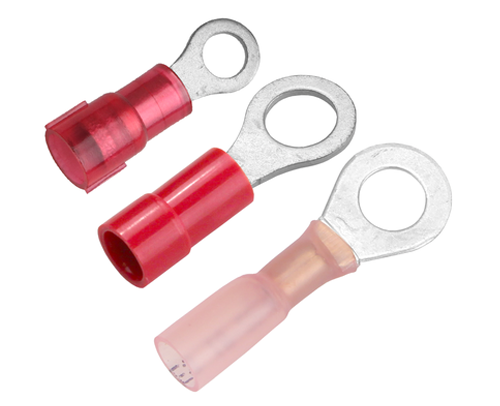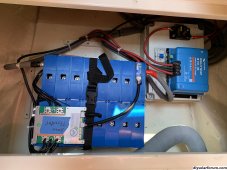Awesome for you. But, you realize the experience of your single boat doesn't reflect the combined experiences of thousands of others? Not planning for the possibility of a knockdown on an ocean going sailboat is irresponsible.hmm, my 44ft boat is 41,000lbs fin and skeg, 7 ft 2 inch draft. we have done 37,000nm in here in the last 11 years with 3 Atlantic crossings. We dont get jolted by waves. We have never been knocked down.
You are using an out of date browser. It may not display this or other websites correctly.
You should upgrade or use an alternative browser.
You should upgrade or use an alternative browser.
Sailboat batteries: EVE/CALB or Fortune/Winston?
- Thread starter madmike
- Start date
You assume so much. Who said I wasn't prepared for an ocean crossing. I have done several. In reserve, we have a complete lead domestic bank. We don't depend on the lithium at all. I will be doing another ocean crossing next year and one the year after. I also work with lithium batteries commercially doing consultancy work. I have no issues with aluminium cased batteries in a heavy bluewater boat. A small power boat puts cells through dramatically higher shock loads than they will ever see on my boat. Like a said, properly constructed compressed cells are way more secure than cells taped together in a drop in battery.Awesome for you. But, you realize the experience of your single boat doesn't reflect the combined experiences of thousands of others? Not planning for the possibility of a knockdown on an ocean going sailboat is irresponsible.
I would like to see the evidence of your thousands of others with destroyed cells from sailing boats. I will await your response with interest
I nev
I also said that either Winstons or Aluminum case EVEs are fine if installed correctly, so they can't move. I don't think we disagree, as much as we misunderstood each others posts.
I never said *you* were not prepared. This discussion is about what batteries are appropriate for an ocean bound sailboat. And for that, any ocean bound sailboat needs to be prepared for a knockdown. Then you stared talking about how you never had a knockdown, and it came across like they don't happen. They do. Boats must be prepared for them. I didn't mean thousands of boats have damaged cells. I meant thousands of boats experience knockdowns and hard jolts from rouge waves.You assume so much. Who said I wasn't prepared for an ocean crossing. I have done several. In reserve, we have a complete lead domestic bank. We don't depend on the lithium at all. I will be doing another ocean crossing next year and one the year after. I also work with lithium batteries commercially doing consultancy work. I have no issues with aluminium cased batteries in a heavy bluewater boat. A small power boat puts cells through dramatically higher shock loads than they will ever see on my boat. Like a said, properly constructed compressed cells are way more secure than cells taped together in a drop in battery.
I would like to see the evidence of your thousands of others with destroyed cells from sailing boats. I will await your response with interest
I also said that either Winstons or Aluminum case EVEs are fine if installed correctly, so they can't move. I don't think we disagree, as much as we misunderstood each others posts.
Ampster
Renewable Energy Hobbyist
I spent many years racing sailboats and probably have 10,000 miles of ocean racing including a half dozen races to Mexico and we never experienced a knockdown but with probably a million sailboats on the ocean a few thousand knockdowns are likely. We had plenty of roundups in 40 knot winds but never a knockdown. Sailbags and gearbags moved around but everything else was fastened down.I meant thousands of boats experience knockdowns and hard jolts from rouge waves.
danphillips
New Member
- Joined
- Oct 29, 2019
- Messages
- 108
Stick with a plastic cased cell, thin aluminum cases do not do well with salt water.
Ampster
Renewable Energy Hobbyist
Salt water? Unless he is planning on putting them in the bilge, they most likely will not see much salt water. Sailboat masts are made of aluminum and do okay with salty spray..thin aluminum cases do not do well with salt water.
jdege
New Member
- Joined
- Dec 16, 2020
- Messages
- 138
A great many LiFePO4 installs are in the bilge...Salt water? Unless he is planning on putting them in the bilge, they most likely will not see much salt water. Sailboat masts are made of aluminum and do okay with salty spray..
Ampster
Renewable Energy Hobbyist
The OP will have to clarify where he is locating them and how much water they could be expeposed to. If that is the case and they are surrounded by bilge water then he may want to consider plastic shelled cells as mentioned earlier.A great many LiFePO4 installs are in the bilge...
jdege
New Member
- Joined
- Dec 16, 2020
- Messages
- 138
There are commercially available LiFePO4 batteries that are rated IP67 or better.The OP will have to clarify where he is locating them and how much water they could be expeposed to. If that is the case and they are surrounded by bilge water then he may want to consider plastic shelled cells as mentioned earlier.
Of, of course, you could always install them in battery boxes.
Batteries will be inside some kind of home-built box (probably something like IP22), under the quarter berth. There are plywood bulkheads separating this area from the stern of the hull and the bilge where there might be seawater splashing around in extreme conditions. So I don't expect the batteries to get wet or salty other than through condensation and airborne moisture & salt.
Long range plans include crossing the South Pacific. We're not expecting huge waves, knockdowns, or round-ups, but want to be prepared for that possibility. Kinda like we aren't planning to be hit by lightning, but understand that it might happen.
Long range plans include crossing the South Pacific. We're not expecting huge waves, knockdowns, or round-ups, but want to be prepared for that possibility. Kinda like we aren't planning to be hit by lightning, but understand that it might happen.
I'm my opinion, that's a very poor choice for any battery. Our batteries are under the saloon seats. Central in the boat and well above a deep bilge. The battery box is waterproof up until water flows over the saloon cushionsA great many LiFePO4 installs are in the bilge...
They are a horrible company. I bought one of their metal battery boxes for 280Ah cells on Amazon. After a month, (it was supposed to be at my door in ten days), they still had not shipped it. Eel then sent me a note saying it needed to go by ship and I should have it in three months. I cancelled the order and they never issued a refund. A few days later I noticed they were no longer on Amazon. in the end Amazon did the right thing and issued a refund. Eel is just another Chinese scammer with horrible ethics… I would not touch that company with my worst enemies 10’ pole…Does anybody know whether EEL Battery is one of the reliable sources?
Thanks, everyone, for the input. It's helpful. The point about larger cells having more internal inertia is helpful. "Most of the time sailing is more gentle than speed boats, but once in a while you hit a big wave," sounds about right to me.
Daddy Tanuki
Solar Wizard
no he seemed pretty full of himself to me as well.I nev
I never said *you* were not prepared. This discussion is about what batteries are appropriate for an ocean bound sailboat. And for that, any ocean bound sailboat needs to be prepared for a knockdown. Then you stared talking about how you never had a knockdown, and it came across like they don't happen. They do. Boats must be prepared for them. I didn't mean thousands of boats have damaged cells. I meant thousands of boats experience knockdowns and hard jolts from rouge waves.
I also said that either Winstons or Aluminum case EVEs are fine if installed correctly, so they can't move. I don't think we disagree, as much as we misunderstood each others posts.
Ampster
Renewable Energy Hobbyist
That is important in a sailboat where you want the weight low and away from the bow and stern......they have a design that permits constructing a solid battery in pretty much any configuration you choose....
mezza
New Member
In my sailboat I used 100Ah batteries. One reason is they are half the weight and size of a 200 Ah battery. Easier to carry down the companion way. More options to orient them in the rack or under the seats. When I moved my batteries out of the engine room, away from the heat, and placed them in the salon under the sattee the boat sat level. Previously it listed to the galley side, which was heavy with the stove, refrig, freezer, hot water.
John Simmons
New Member
- Joined
- Feb 1, 2020
- Messages
- 44
I also have fortune 100Ah cells in my sailboat, 1200 Ah worth. I am trying to find where to get the red 18-22awg connectors that will fit over the 10mm posts on the batteries. I can’t seem to find them or the 7/16 ring terminal size anywhere.
Does anyone know where I can get 20 of them?
john
Does anyone know where I can get 20 of them?
john
bestconcreteblock
New Member
- Joined
- Dec 5, 2022
- Messages
- 62
https://www.digikey.com/en/products/detail/mueller-electric-co/AI-50043N/17762655I also have fortune 100Ah cells in my sailboat, 1200 Ah worth. I am trying to find where to get the red 18-22awg connectors that will fit over the 10mm posts on the batteries. I can’t seem to find them or the 7/16 ring terminal size anywhere.
Does anyone know where I can get 20 of them?
john
I also have fortune 100Ah cells in my sailboat, 1200 Ah worth. I am trying to find where to get the red 18-22awg connectors that will fit over the 10mm posts on the batteries. I can’t seem to find them or the 7/16 ring terminal size anywhere.
Does anyone know where I can get 20 of them?
john
I get all of my wire and connectors from pacer.

Ring Terminals for 22 AWG - 18 AWG Wire
Pacers 22-18 AWG ring terminals create lasting electrical connections. Choose from #6, #8, #10, 1/4", 5/16" or 3/8" stud sizes. Available in four insulations.
John Simmons
New Member
- Joined
- Feb 1, 2020
- Messages
- 44
I have been buying battery cable at bestboat wire.com, and other assorted heavy duty terminal lugs etc. I am now in New Zealand and the site comes up as https://www.boatwireusa.com/ They just did not have anything in 18-22 awg for the fortune 100Ah 10mm metric posts. DigiKey had them and something else I needed, so it was a good idea.
john
john
Similar threads
- Replies
- 22
- Views
- 2K
- Replies
- 26
- Views
- 1K
- Replies
- 2
- Views
- 346
- Replies
- 18
- Views
- 696
- Replies
- 6
- Views
- 432



